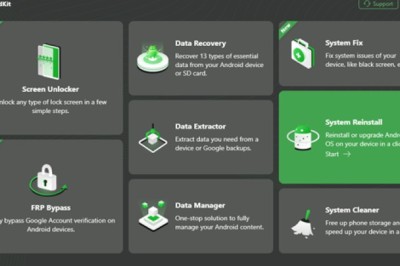views
Public key infrastructure is essential for users, machines, software, and other digital products to transmit data safely. However, deploying, running, and managing a PKI for an enterprise is a challenging process. A single error might have severe effects.

Businesses are shifting more frequently to PKI as a service to retain security yet make the process easier. In the digital era, public key infrastructure plays a crucial role in daily life. Here's a description of how PKI functions, including everything from the login information on your website to the sensitive information you exchange over email.
What Is the Process of Public Key Infrastructure?
It's time to discuss PKI and how it connects to public-key encryption now that you are familiar with both concepts. The following are some crucial details about how PKI functions:
PKI verifies your site and you. It enables web browsers used by visitors to your site to identify your website before connecting to it (so they can ensure that they're talking to a reliable server). Businesses can also use client credentials to restrict access to authorized users. As a result, you now have more authority over your networking and other IT systems.
Managed PKI allows you to encrypt and decode data or the communication systems you use to transfer it using the safe SSL/TLS protocol by employing SSL signature or public encryption key sets.

PKI guarantees the information's integrity. Users, their websites, or their equipment can utilize PKI to determine whether the information you provide has been altered.
Naturally, carrying out any of these actions necessitates the usage of public encryption keys with high entropy. So, it is because every key controls how plaintext is converted into ciphertext, a randomly produced string of binary digits or a random sequence of 1s and 0s.
In this hyper-connected environment, PKI is the foundation of IT firms, and connectivity with IT services is rising. Moreover, PKI is a crucial piece of infrastructure. Thus, businesses need to employ experts familiar with every process detail.
Effective PKI administrators and knowledgeable team members need to be knowledgeable about the implementation, upkeep, and assistance of PKI alternatives and the enterprise's verification infrastructure. Such knowledge should include:
· Appropriate digital certificate planning.
· The ability to troubleshoot service problems.
· The ability to assess upgrades and other modifications to the PKI infrastructure.
· Many enterprises outsource PKI implementations to PKI professionals for smooth operating processes.
PKI for authentication
PKI offers digital certificates that attest to the user's legitimacy. It serves to authenticate individuals onto a system or an area utilizing smart cards because the user is authenticated and the user is legitimate.

These digital certificates can authenticate other computers and gadgets so they can connect to the network and use its resources. These can apply to routers and other network equipment like intrusion detection systems.
PKI for Internet
The most popular method of visiting sites is HTTPS, a safe form of HTTP frequently used when browsing the Internet. The communication to the host is encrypted when we are using HTTPS. The browser originally receives a certification from the server to ensure we link to the proper server. Then, a secure connection is established using the certificate's public key following certificate validation.
This certificate establishes the legitimacy of the server, improves security, protects the connection, and inspires user confidence in the website. The browser will warn the viewer not to believe the site if the certificate is incorrect or expired and frequently may even forbid the user from visiting that specific page.

What problems is PKI able to solve?
Trust
PKI enables customers to validate the reliability of gadgets and websites. By doing this, customers are guaranteed to connect to the correct website. Additionally, the server and user communications continue to be encrypted. Therefore, it eliminates the possibility of a man-in-the-middle operation or being faked.
Thanks to PKI, customers can trust e-commerce websites and safely complete online payments. In addition, PKI guarantees the legitimacy of all sides and secures communication between them, enabling the parties to develop a sense of confidence.
Authentication
Because individuals tend to share, scribble on post-its, etc., passwords have proven weak. Since identification is authenticated through the creation of digital certificates, an organization can use PKI to authenticate individuals, devices, and programs.
Security
PKI boosts security since it eliminates all other attack vectors once authentication is established and trust is raised. However, people are often the weakest points in safety, and PKI implementation leaves users with little control. Digital certificates ensure that users won't be using credentials or pins that organizations can easily crack, thanks to PKI, which ensures all rules are upheld, safety is in place, and all rules are maintained. PKI, which businesses can protect, will be the only variable left, securing the network.
The purpose of PKI
PKI offers a mechanism to identify users, gadgets, and applications while delivering strong encryption to ensure that both sides' communications stay private.
PKI offers digital signatures and certifications in addition to identification and recognition to help certificate holders build personalized login credentials and verify their identity.
PKI is utilized by TLS/SSL, which is used throughout the first Internet. First, the client obtains the license and verifies it to guarantee its authenticity before communicating with the server. Afterward, it uses asymmetric encryption to secure all communication with and from the server.
Conclusion
Cybersecurity is inextricably linked to public key infrastructure. Therefore, PKI is essentially one of the components that contribute to the operation of cyber security.
In a word, public key infrastructure is a mechanism for safeguarding communications between various computer systems that is dependent on encryption key combinations and digital certificates. Additionally, it's a system that aids your company in maintaining compliance with legal requirements for security and privacy issues and avoiding penalties, fees, and reputational damage.
























Comments
0 comment